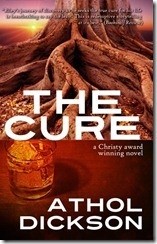
It’s gratifying when readers take the time to review one of my books. Here’s a review posted at Amazon by Claudette Wood.
She dropped the envelope in the offering plate. The note inside it read, “May the Lord forgive me, I should have done this long ago. Whoever opens this, please give it to the pastor. He’ll know what to do. Tell him it will cure alcoholics, and I want everyone to have it. Tell him if they ever drink again, the urge will return stronger than ever. I used to think there was a way to fix that too, but now I know there isn’t. Anyway, this will cure them so long as they never drink another drop.”
A rumor that someone in his hometown has discovered the cure for alcoholism brings Riley Keep back to the place of his past. Hoping to find cash to buy alcohol in an envelope stolen from a church’s offering plate, Riley instead discovers a small amount of the cure–along with the formula for the cure. He views the discovery as a Godsend; yet what happens after his cure is anything but a blessing. Riley makes an effort to right the wrongs he has committed–some real and some a product of a terrible lie he’s accepted as truth. No matter what he does, though, nothing works out for the good, with the result being a town destroyed by desperate people hoping for an instant cure; a seriously wounded wife; and a hunted woman murdered for what she knows, and Riley accused of her murder.
Upon learning of his teenage daughter, Bree’s, pregnancy, Riley offers to take care of her by buying her a house, a car, everything she will ever need–all from the money he earned by selling a stolen formula to a (dishonest) corporation. Her answer to him is no.
She tells him, “I think sometimes the right thing is the wrong thing. I made a bad mistake. I need to live with this, you know? Not take the easy way out this time. I think that’s how God shows you the way to be a person.”
The time you spend reading The Cure will be time well spent. It speaks to alcohol addiction, but is relevant to all addiction. There is no fairy-tale ending here. Real life isn’t that way (it’s only one of the things I admire about Athol Dickson’s ability to tell a story). This is a story of failure, as we are reminded by Riley’s example we can’t do it all by ourselves. It is also a story of faithfulness, shown by the commitment of an abandoned wife who keeps her vows to a man through the worst part of “for better or worse.” Most important, it’s a story of redemption, as we are reminded that God never leaves us, no matter how deep we live in our sins.